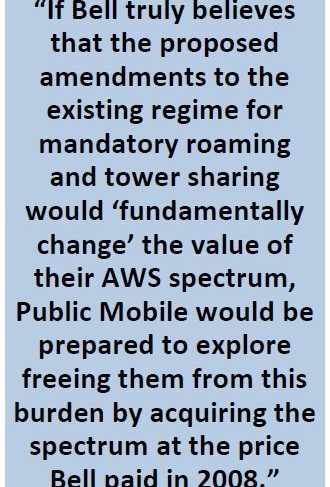
OTTAWA – Mandated tower/site sharing and roaming is still a wreck, say the newer entrants into the Canadian wireless market.
In its reply comments to Industry Canada on “Proposed Revisions to the Frameworks for Mandatory Roaming and Antenna Tower and Site Sharing”, Bell Canada argues that reopening the Advanced Wireless Services (AWS) conditions of licence (COLs) less than halfway through the 10-year licence terms creates considerable uncertainty with respect to Industry Canada’s auction policies.
“To maintain the integrity of the department's spectrum auction process, it is equally important that bidders can rely on the knowledge that the applicable COLs, developed pursuant to a thorough public consultation process, are fixed for the duration of the licence term. With this context, the company considers that changes to the existing COLs be kept to a minimum and that the department resists calls for further extensive and fundamental changes to its processes,” Bell writes.
Public Mobile, however, takes square aim at Bell’s assertion that it made AWS auction decisions with the knowledge that the COLs were already established. Public Mobile says that’s not true, noting in its reply that the COLs were not finalized until November 2008, four months after the auction was completed. “If Bell truly believes that the proposed amendments to the existing regime for mandatory roaming and tower sharing would ‘fundamentally change’ the value of their AWS spectrum, Public Mobile would be prepared to explore freeing them from this burden by acquiring the spectrum at the price Bell paid in 2008,” the company writes.
Establishing a database of information regarding towers and antenna sites has been proposed by Industry Canada as a way to improve tower sharing. The incumbent wireless carriers have argued against such a database, but Public Mobile says their arguments are disingenuous. While the incumbents say responding to large amounts of preliminary information packages (PIP) and proposals to share (PTS) is a burden, they also argue against a database of tower information as being a security threat.

“If new entrants are truly overburdening them with PIP and PTS requests, a tower information database will provide a real and effective solution. Clearly, the incumbents are making arguments most convenient to them without regard for the fact that they are contradicting themselves in their own submitted comments,” says the new entrant.
Wind Mobile counters suggestions from incumbents that because there have been very few instances of arbitration means the current system is working. There has been virtually no arbitration because there has been no sharing, Wind says in its comments. The upstart wireless company is equally adamant that roaming rules need to change. Wind says while the existing roaming was contained in a package of pro-competitive policies for the 2008 AWS auction, the situation has essentially given the large incumbent licensees greater power over the new entrants, and this needs to change.
The resulting roaming agreements are “terrible” for new entrants and for all Canadians because subscribers of the Canadian new entrants “pay vastly more for domestic roaming than they would if the underlying services were negotiated by two parties with equal bargaining power.”
In a footnote on this particular section, the company adds that because it doesn’t have “substantial negotiating leverage” data roaming from major U.S. carriers is “less than 20% of the rate Wind pays to its domestic roaming providers, and voice roaming rates are approximately 50% of the domestic roaming rates.”
Broadening the scope of roaming to be indefinite and unrestricted, while beneficial to some carriers, will harm others, says MTS Allstream in its reply. If the government’s proposal “is left unaltered it will make the challenging economic case of investing in capital-intensive leading edge networks to low density areas even more difficult,” says the company.
It adds that this wider approach to roaming “will frustrate the departmental goal of investment in, and deployment of, advanced networks that provide the greatest choice of basic and advanced services available at competitive prices to the greatest number of Canadians.”


